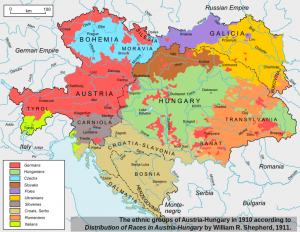Austria-Hungary was a multilingual empire in Central Europe. It consisted of the entire territories of today’s Austria, Hungary, Czech Republic, Slovakia, Slovenia, Croatia, Bosnia-Herzegovina as well as parts of Romania, Serbia, Poland, Ukraine and Italy. It thus contained many different nationalities within its borders. For this reason, a multitude of languages were spoken in the Habsburg Empire: German, Czech, Slovak, Polish, Romanian, Hungarian, Italian, Slovenian, Serbo-Croatian, Russian, Ruthenian, Yiddish and Ukrainian. Since the compromise of 1867, the empire was split into two halves: the Kingdom of Hungary and the Austrian part of the empire, which was often called Cisleithania (which means ‘the lands on this side of the river Leithe’).

Most multi-lingual states have a dominant language. In the People’s Republic of China or the Russian Federation, it is the language of the dominant ethnic group. In India, Nigeria and many other former colonies in Africa or Asia, it is the language of the former imperial power. However, Austria-Hungary, or at least the Austrian half of the empire, did not have such a dominant language. While German and Hungarian were the language of the two ethnic groups that dominated the empire politically, these two ethnic groups by no means constituted a majority. Even in the Kingdom of Hungary, Hungarians made up half of the population. From the 1870s onwards, the Hungarian government tried to impose its language on all minorities in their half of the empire.
How did the fact that there was no common language, which everybody spoke, influenced the functioning of the institutions of the empire?
When Austria-Hungary mobilised its army in July 1914 at the outbreak of the First World War, the mobilisation orders were printed in eleven languages. While German was the main language of the army, this ‘command language’ was limited to only about 80 words. Officers had to learn the language of their troops. So if a German-speaking officer commanded an Italian regiment, he and his fellow officers had to learn Italian while the Italian-speaking troops had only to learn the 80 words of the German ‘command language’. However, in the first weeks of the First World War many officers were killed. The reserve officers, who replaced them, did not speak the language of their new regiments. Still, the Austrian-Hungarian army managed to fight for four years at different fronts. The officers of imperial Germany, Austria-Hungary’s main ally in the war, regarded it as a miracle that the Austrian-Hungarian army managed to function despite its multilingualism.
Most interestingly the parliament of the Austrian half of the empire, based in Vienna, did not have an official single language. Deputies were permitted to talk in German, Czech, Polish, Ruthenian, Croat, Serbia, Slovenian, Italian, Romanian and Russian. However, no interpreters were provided, nor were there facilities to record the speeches that were not made in German. Thus, unless the deputy in question provided parliament with a copy of his speech, it was often difficult to judge if he actually addressed the issue at hand or if he spoke about something completely different! That parliament still managed somehow to work can also be regarded as a small miracle.



